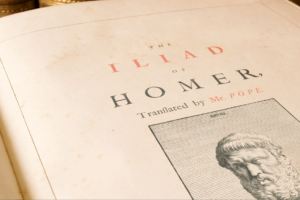by The Cowl Editor on September 28, 2017
Campus

by Andrea Traietti ’21
Opinion Staff
The Development of Western Civilization. More lovingly just referred to as Civ. For most freshmen, Civ is unlike anything they have ever experienced before. Between lengthy syllabi, long reading assignments, and two-hour long classes, Civ can be quite the challenge for a college freshman trying to adjust to much more than new classes and professors.
As a freshman myself, there have already been a few reading assignments that have kept me up at night. After working on nothing else for a week, I just recently subtmitted my very first Civ paper— the longest paper ever written in my academic career.
Coming into Providence College I was excited for Civ, having studied classics in the past and interested in philosophy and history, and I could not wait to experience a class that could tie everything together.
However, after my first month of Civ, I was starting to feel like maybe it was not all it was cracked up to be. The readings were getting longer and more difficult, and by the time I received my first essay topics about two weeks ago, I was just about ready to embrace Civ for what pretty much everyone characterizes it to be: torture.
However, sitting in a Ruane classroom the other day (ironically, working on my Civ essay), I overheard a tour stopped in the hallway. The student leading the tour started talking about Civ, and in his words, he summed the class up as “something you complain about while it’s going on, but really appreciate when you look back on it.”
I had certainly done my fair share of complaining, but thinking back to when I was actually excited about Civ, I realized that I really did not want it to be something that I could not appreciate until after it was over. I did not want the workload of the class to detract from its overall value.
So, I have decided to embrace Civ not as something I just have to work my way through, but as an opportunity—one that I should feel very lucky to have.
First of all, just to be able to read and study some of these works is a minor miracle: it is remarkable that some pieces of writing have survived for so many years, especially when we know that many others like them were lost or simply disappeared.
Second, to write down epic poetry or to compose trilogies of plays would have been an immense task in the ancient world, and to write a history book could have meant risking your life (yes, I did just read Sima Qian last week). So, on the one hand, I have to feel thankful just to be able to read some of the things we are reading.
However, on another level, there is something to be said for the class itself, outside of the reading material. From business to biology, Civ is the class for everyone (and not just because it is a requirement.)
In a typical Civ seminar, there are students of many different majors, and each brings a unique perspective to the table.
Civ gives you the chance to bring your point of view to the table, but also to take other perspectives and apply them to your Civ reading, your work in other classes, and maybe even your life. An education of this sort—one that broadens your views—is truly invaluable.
So, perhaps Civ is not branded as the cornerstone of the liberal arts education at PC because it combines different departments or disciplines, but rather because it teaches you how to understand the world, the people in it, and maybe even yourself. In many ways, it forces you out of your comfort zone. Civ quite literally teaches you how to learn and how to be a critical thinker.
Learning to appreciate Civ is something I am going to work harder on, and something PC students should try to do together. So for now I will try to focus on enjoying the work for what it is—valuable, formative, and rewarding—and hope that my first exam next week does not change my mind too much.